Sauerkraut may support gut health, digestion, and immunity thanks to its probiotics, fiber, and vitamins.
This fermented cabbage dish is one of the oldest and most beneficial fermented foods, known for its rich nutrient content and friendly bacteria that support overall wellness. Understanding the health benefits of sauerkraut helps you make informed dietary choices—especially if you’re focusing on gut, immune, and heart health.
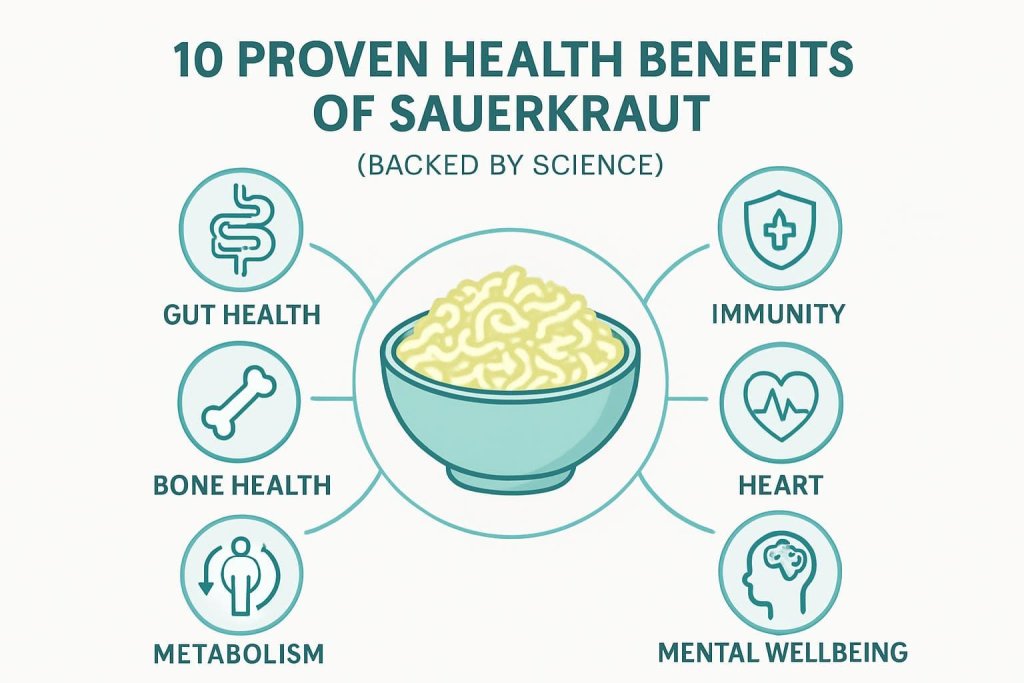
What Is Sauerkraut? (Overview and Nutrition Profile)
Sauerkraut is finely shredded cabbage that has been naturally fermented by lactic acid bacteria—mainly Lactobacillus plantarum and Leuconostoc mesenteroides. This process converts the sugars in cabbage into lactic acid, giving sauerkraut its tangy flavor and long shelf life without preservatives.
Fermentation not only preserves cabbage but also enhances its nutritional value, creating beneficial probiotic cultures, organic acids, and bioactive compounds that may support digestion and overall wellness. Unlike vinegar-pickled cabbage, true sauerkraut relies on live microbial fermentation, making it a natural source of beneficial bacteria.
✅note: Always choose refrigerated, unpasteurized sauerkraut for live cultures. Pasteurized or shelf-stable types are safe but lack probiotics.
Nutritional Profile (Per 1 Cup / ~142 g)
According to the U.S. Department of Agriculture FoodData Central (USDA, 2025), one cup of raw sauerkraut provides:
| Nutrient | Amount | % Daily Value (DV) | Key Role |
|---|---|---|---|
| Calories | 27 kcal | — | Low-calorie fermented food |
| Carbohydrates | 6.1 g | 2% | Provides natural plant sugars |
| Fiber | 4.1 g | 15% | Supports digestive regularity |
| Protein | 1.3 g | 3% | Plant-based amino acids |
| Vitamin C | 21 mg | 23% | Antioxidant that supports immune function |
| Vitamin K | 18.5 µg | 20% | Supports bone and blood health |
| Vitamin B6 | 0.13 mg | 8% | Aids metabolism and energy production |
| Potassium | 241 mg | 5% | Helps regulate heart rhythm and fluid balance |
| Sodium | 939 mg | 39% | Preservative effect—consume in moderation |
Key takeaway: Sauerkraut is low in calories yet rich in fiber, vitamins C and K, and several minerals. However, its high sodium content means it should be enjoyed in small portions, especially for individuals managing blood pressure or cardiovascular conditions (per Cleveland Clinic, 2025).
10 Proven Health Benefits of Sauerkraut (Backed by Science)
Sauerkraut isn’t just a tangy condiment—it’s a nutrient-dense, fermented superfood that may support digestive, immune, and metabolic health. Thanks to its probiotics, fiber, and vitamins, it’s gaining recognition in nutritional science as one of the most beneficial fermented vegetables available.
1. Supports Digestive Health
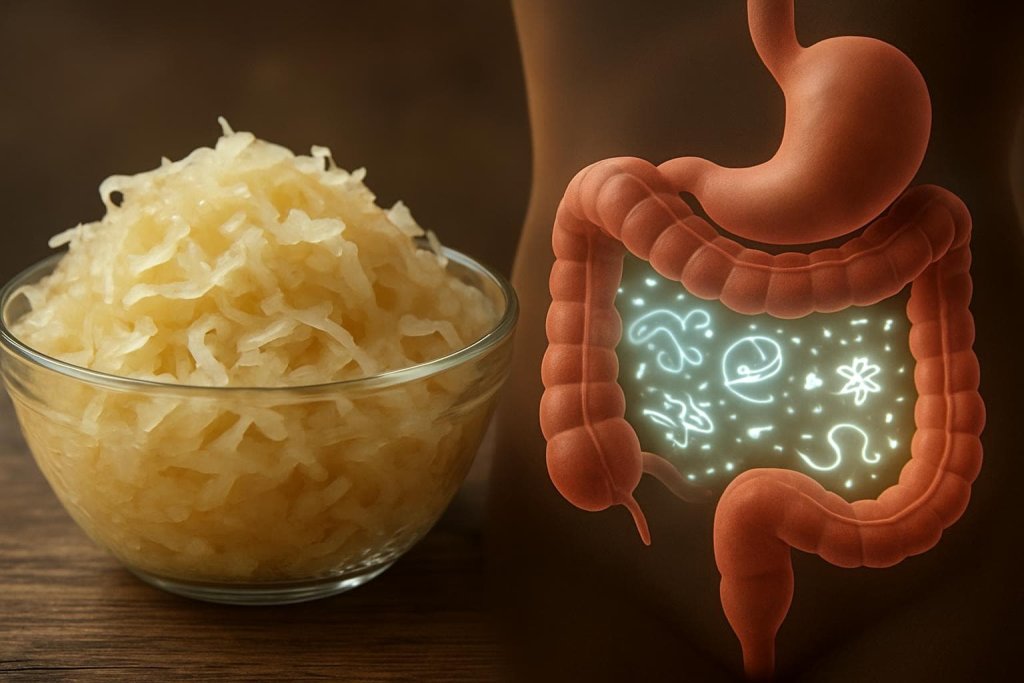
Sauerkraut is naturally rich in dietary fiber and live lactic acid bacteria, both of which may support healthy digestion by promoting gut microbial balance. A 2024 review in Frontiers in Nutrition found that regularly consuming fermented foods like sauerkraut can enhance gut microbial diversity and improve digestive comfort in healthy adults.
Unpasteurized sauerkraut—found in the refrigerated section—contains active probiotic cultures such as Lactobacillus plantarum and Leuconostoc mesenteroides. These beneficial bacteria help break down food components, produce short-chain fatty acids, and may support nutrient absorption in the intestines.
Additionally, sauerkraut’s fiber content supports bowel regularity and satiety, contributing to smoother digestion and overall gut wellness. Choosing raw, unpasteurized sauerkraut ensures you benefit from its live microorganisms and their digestive advantages.
2. Promotes a Healthy Gut Microbiome

The Harvard T.H. Chan School of Public Health notes that fermented foods are rich in beneficial microbes that help maintain a balanced gut ecosystem and strengthen the intestinal barrier (Harvard Nutrition Source, 2025).
Sauerkraut’s beneficial bacteria, such as L. plantarum and Leuconostoc mesenteroides, produce short-chain fatty acids (SCFAs) during fermentation, which may nourish intestinal cells and reduce harmful bacterial overgrowth. Regular inclusion of raw, unpasteurized sauerkraut can support microbial diversity—a crucial factor in overall digestive and immune resilience.
3. May Support Immune Function

Roughly 70% of the immune system resides in the gut, according to the NIH Office of Dietary Supplements. Sauerkraut’s live cultures, vitamin C, and antioxidant compounds may support normal immune function by promoting a balanced gut environment.
A 2024 systematic review in Nutrients highlighted how fermented foods and their microbial byproducts can help modulate immune responses and enhance natural defense mechanisms. SCFAs produced during fermentation—such as butyrate—play a role in supporting healthy inflammatory responses within the gut.
4. Provides Vitamin K2 for Bone Health

During fermentation, certain bacteria synthesize menaquinone (vitamin K2), which plays a key role in bone mineralization and calcium metabolism. Vitamin K2 supports the activation of proteins that transport calcium to bones and teeth rather than soft tissues.
A 2024 study in the Journal of Functional Foods found that fermented foods, including sauerkraut, are natural sources of K2 and may support bone strength and cardiovascular function when consumed regularly. Choosing traditionally fermented sauerkraut can help increase your intake of this valuable nutrient.
5. May Help Support Heart Health

Sauerkraut provides potassium, fiber, and antioxidants, which together may support healthy blood pressure and heart function. According to the Cleveland Clinic, potassium helps regulate fluid balance and counteracts sodium’s effects on blood pressure.
However, because sauerkraut is typically high in sodium (~939 mg per cup per USDA FoodData Central, 2025), portion control is important. Rinsing sauerkraut briefly before serving can reduce sodium content by up to 30%, helping you enjoy its benefits while managing heart health responsibly.
6. Supports Weight Management

With only 27 calories per cup and a substantial 4 grams of fiber, sauerkraut is a filling, nutrient-rich food that may help support weight management goals. Fiber promotes satiety and helps regulate appetite, while the mild acidity and probiotics may aid digestion of other foods.
Adding sauerkraut to balanced meals—such as salads, grain bowls, or lean proteins—can enhance flavor and nutrient density without adding excess calories or fat. Its low-calorie profile makes it an easy addition to mindful eating plans.
7. May Support Mental Wellbeing
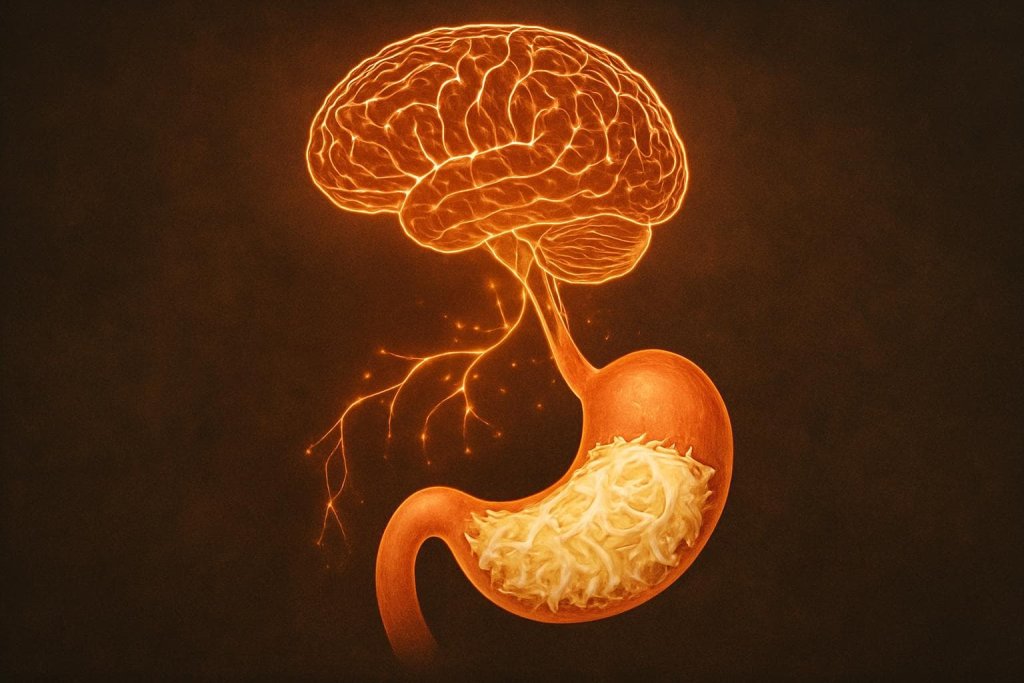
Recent studies show a connection between the gut and brain, known as the gut–brain axis. The Proceedings of the Nutrition Society (2024) reported that diets rich in fermented foods and fiber may support emotional balance by influencing gut microbiota and neurotransmitter production (Cambridge University Press, 2024).
Sauerkraut’s beneficial microbes may support this gut–brain communication system, potentially influencing mood and stress resilience. While more human research is needed, maintaining a healthy gut microbiome through probiotic foods is an emerging strategy for mental wellness.
8. Rich in Antioxidants
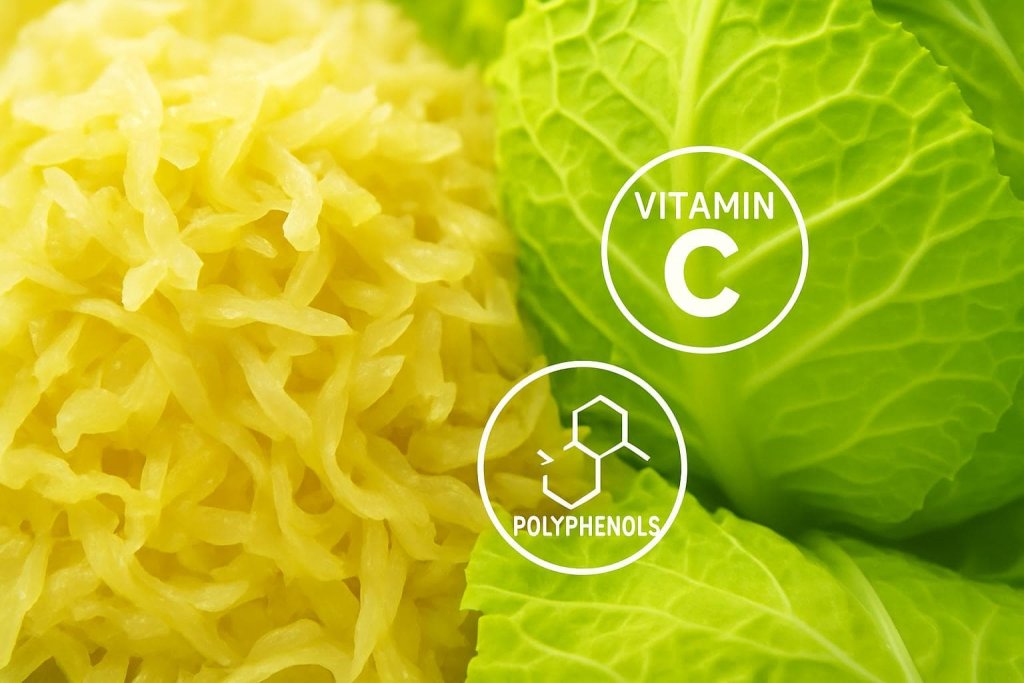
Sauerkraut is naturally rich in antioxidants such as vitamin C, carotenoids, and polyphenols derived from cabbage. These compounds may help reduce oxidative stress, which is linked to cellular aging and inflammation.
A 2025 review in Antioxidants (MDPI) found that fermented vegetables retain or even increase antioxidant activity during fermentation due to the formation of bioactive metabolites. Including sauerkraut as part of a plant-rich diet may support long-term cellular and immune health.
9. May Support Metabolic Health
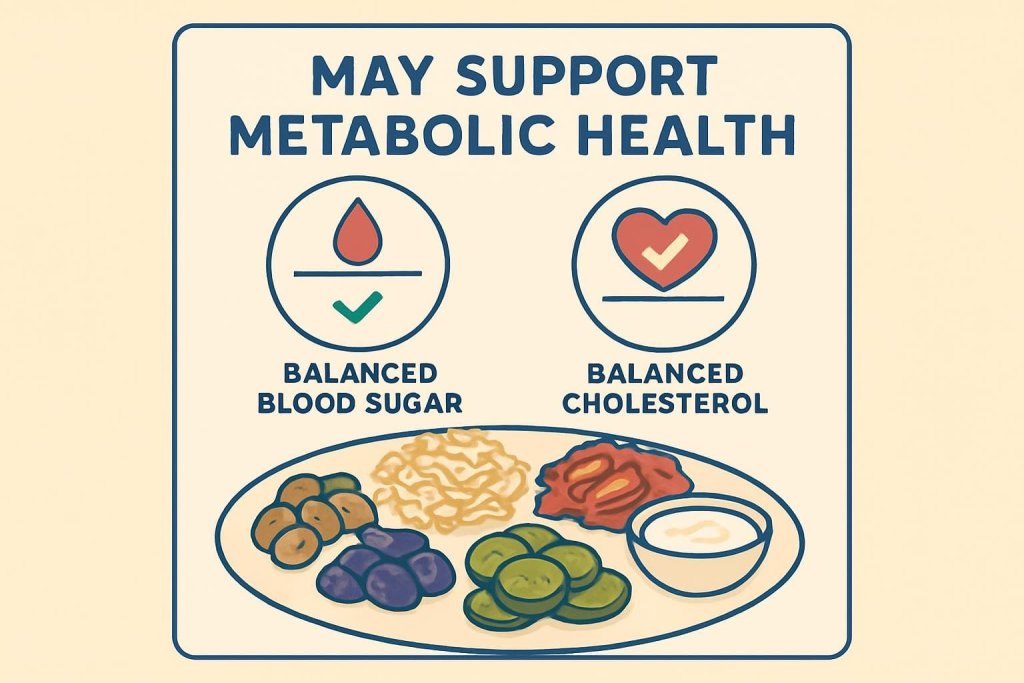
Sauerkraut’s combination of probiotics, fiber, and bioactive compounds may support balanced blood sugar and cholesterol levels. A 2024 study in Frontiers in Endocrinology found that regular consumption of fermented foods was associated with improved metabolic markers and insulin sensitivity in adults.
The probiotics in sauerkraut may influence lipid metabolism and help maintain healthy cholesterol ratios. Integrating small portions into meals with whole grains and lean proteins supports metabolic balance as part of an overall healthy eating pattern.
10. May Aid Nutrient Absorption
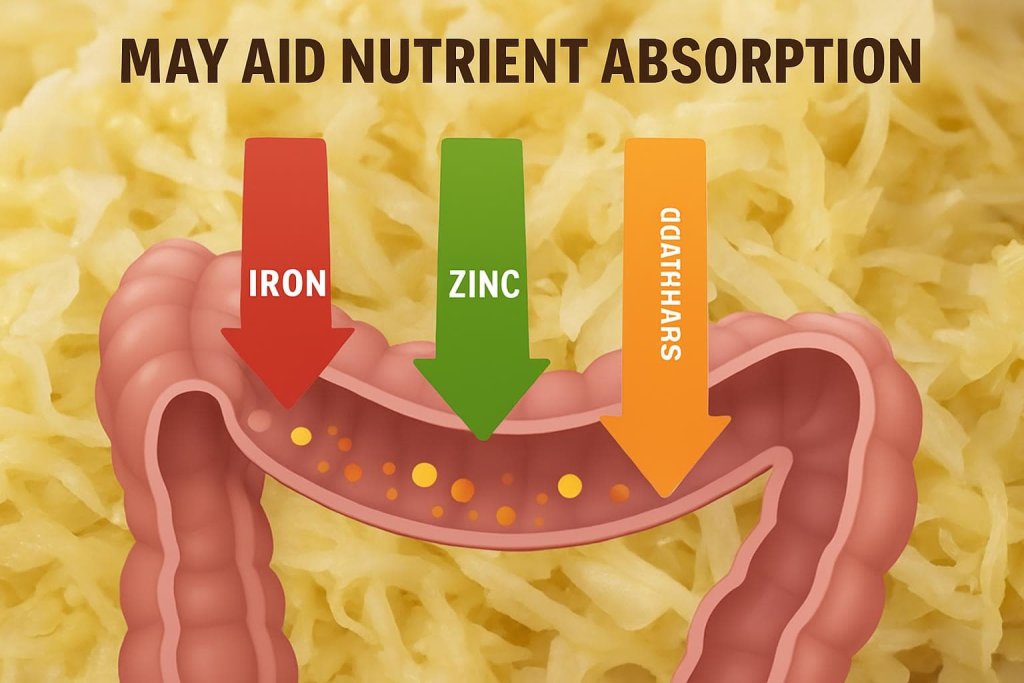
Fermentation may help increase the bioavailability of essential vitamins and minerals such as B vitamins, iron, and zinc. During fermentation, beneficial lactic acid bacteria naturally reduce antinutrients like phytates—compounds that can interfere with mineral absorption in the gut.
According to the U.S. Department of Agriculture’s Agricultural Research Service (USDA-ARS), properly fermented vegetables like sauerkraut typically reach a pH range of 3.2 to 3.4, which supports both food safety and nutrient preservation (USDA-ARS Fermented Vegetables Publication, 2025). Maintaining this level of acidity ensures that the fermentation process not only prevents spoilage but also enhances the nutritional value of the final product.
How to Add Sauerkraut to Your Diet

Sauerkraut is a versatile, nutrient-rich addition to everyday meals—and you don’t need much to gain its benefits. Because heat can destroy beneficial probiotics, it’s best to enjoy sauerkraut raw or added after cooking.
Safe and Practical Ways to Eat Sauerkraut
- As a side dish: Serve a few spoonfuls alongside eggs, rice bowls, or grilled meats.
- In salads: Toss into green salads or coleslaw for a tangy probiotic boost.
- In sandwiches or wraps: Use as a topping on sandwiches, burgers, or wraps to add flavor and crunch.
- With fermented pairings: Combine with kefir, yogurt, or miso for a gut-friendly meal.
- After cooking: If adding to soups or stir-fries, stir in sauerkraut after removing from heat to preserve live bacteria.
Food Safety and Storage Tips
According to the USDA Food Safety and Inspection Service (FSIS), proper fermentation requires a pH of 4.2 or lower to inhibit harmful bacteria.
- Always store unpasteurized sauerkraut in the refrigerator (below 40°F / 4°C).
- Check for off odors, mold, or sliminess—signs of spoilage.
- Use clean utensils to avoid cross-contamination.
- Keep containers sealed to maintain freshness and prevent oxidation.
By following these storage and handling tips, you preserve sauerkraut’s live cultures and ensure it remains safe to eat.
Possible Side Effects and Precautions
While sauerkraut offers numerous benefits, some people should consume it mindfully due to its sodium content and natural production of biogenic amines such as histamine and tyramine.
1. High Sodium Levels
One cup of sauerkraut contains about 939 mg of sodium, roughly 39% of the daily limit (USDA, 2025). Excess sodium intake may affect blood pressure and cardiovascular health.
→ The Cleveland Clinic recommends rinsing sauerkraut before eating to reduce sodium by up to 30%.
2. Histamine Sensitivity
Fermented foods can contain histamine, which may trigger reactions such as headaches, flushing, or nasal congestion in sensitive individuals.
→ The National Institutes of Health (NIH) notes that histamine intolerance varies widely among individuals, and limiting fermented foods can help reduce symptoms.
3. Medication Interactions
Sauerkraut contains tyramine, a naturally occurring compound that can interact with monoamine oxidase inhibitor (MAOI) medications. The Mayo Clinic advises people taking MAOIs to avoid or limit high-tyramine foods to prevent spikes in blood pressure.
4. Digestive Adjustments
For those new to fermented foods, start with 1–2 tablespoons daily and increase gradually. Rapid introduction may lead to mild bloating or gas as your gut microbiome adjusts.
Guidance: Individuals with chronic conditions such as hypertension, allergies, or gastrointestinal disorders should consult a qualified healthcare provider before significantly increasing fermented food intake.
FAQs About Sauerkraut
1. Does all sauerkraut contain probiotics?
No. Only unpasteurized, refrigerated sauerkraut contains live probiotic bacteria. Shelf-stable or canned versions are pasteurized, which kills beneficial microbes.
2. How much sauerkraut should I eat daily?
About 1–2 tablespoons per day is sufficient for most people to gain probiotic benefits without excess sodium.
3. Can I cook sauerkraut without losing its benefits?
Yes—but add it at the end of cooking or after removing from heat. High heat destroys live bacteria.
4. Is sauerkraut safe for people with high blood pressure?
Yes, in moderation. Rinse before eating or choose low-sodium versions to reduce salt intake.
5. What’s the difference between pickled cabbage and sauerkraut?
Pickled cabbage is preserved in vinegar, while sauerkraut is fermented naturally, producing beneficial lactic acid and probiotics.
6. Can homemade sauerkraut be safe?
Yes, if prepared under hygienic conditions, kept at 65°F–72°F during fermentation, and fermented until the pH is ≤4.2. Always refrigerate after opening.
7. Does sauerkraut help with digestion?
It may support digestion and gut balance due to its fiber and probiotic content, but it is not a treatment for digestive disorders.
Conclusion
Sauerkraut is more than a flavorful condiment—it’s a science-backed fermented food that may support digestion, immunity, nutrient absorption, and gut health when eaten in moderation. Its combination of probiotics, vitamins, and antioxidants makes it a valuable addition to a balanced diet.
To enjoy its benefits safely, choose raw, unpasteurized sauerkraut, store it properly, and consume modest portions due to its sodium content.
This content is for informational purposes only and not medical advice.
References:
